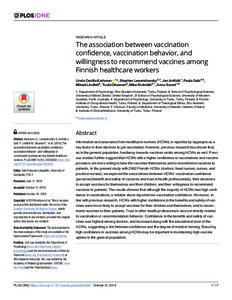The association between vaccination confidence, vaccination behavior, and willingness to recommend vaccines among Finnish healthcare workers
Linda Cecilia Karlsson; Stephan Lewandowsky; Jan Antfolk; Paula Salo; Mikael Lindfelt; Tuula Oksanen; Mika Kivimäki; Anna Soveri
https://urn.fi/URN:NBN:fi-fe2021042826419
Tiivistelmä
Information and assurance from healthcare workers (HCWs) is reported by laypeople as a key factor in their decision to get vaccinated. However, previous research has shown that, as in the general population, hesitancy towards vaccines exists among HCWs as well. Previous studies further suggest that HCWs with a higher confidence in vaccinations and vaccine providers are more willing to take the vaccines themselves and to recommend vaccines to patients. In the present study with 2962 Finnish HCWs (doctors, head nurses, nurses, and practical nurses), we explored the associations between HCWs’ vaccination confidence (perceived benefit and safety of vaccines and trust in health professionals), their decisions to accept vaccines for themselves and their children, and their willingness to recommend vaccines to patients. The results showed that although the majority of HCWs had high confidence in vaccinations, a notable share reported low vaccination confidence. Moreover, in line with previous research, HCWs with higher confidence in the benefits and safety of vaccines were more likely to accept vaccines for their children and themselves, and to recommend vaccines to their patients. Trust in other health professionals was not directly related to vaccination or recommendation behavior. Confidence in the benefits and safety of vaccines was highest among doctors, and increased along with the educational level of the HCWs, suggesting a link between confidence and the degree of medical training. Ensuring high confidence in vaccines among HCWs may be important in maintaining high vaccine uptake in the general population.
Kokoelmat
- Rinnakkaistallenteet [29335]
